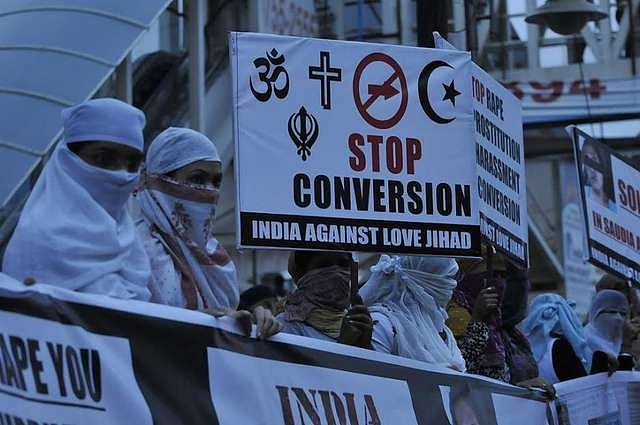Politics
Looking At The Larger Picture: Love Jihad Is A Question Of National Security
- Love jihad is not a propaganda, and NIA must be allowed to do its job as it is a question of national safety.

Love jihad
The story of 24-year-old Hindu woman, Akhila, who converted to Islam and was rechristened Hadiya, is at the centre of a ‘love jihad’ controversy that has been in the news lately. Hadiya’s father Asokan K M, an atheist and a former military personnel, upset over the conversion, approached the police station and filed a habeas corpus petition in the Kerala High Court in 2016. However, Hadiya’s subsequent marriage to a Muslim man Shefin Jehan in December compelled him to file another petition.
The High Court nullified the marriage on 24 May 2017 and even ordered a probe into it, sending her back to her parent’s home. Observing that she was a “weak and vulnerable girl capable of being exploited”, the court even directed that she must not interact with outsides given her position.
However, her husband moved the Supreme Court against the nullification of their marriage. A Supreme Court Bench, headed by Chief Justice Dipak Misra, has prima facie found that the High Court had no authority to annul the inter-religious marriage between Jehan and Hadiya.
However, in August, the Supreme Court asked the National Investigation Agency (NIA) to probe whether there was a wider pattern in the alleged ‘love jihad’ case in the state. The CPI (M)-led Kerala government rejected the NIA probe in an affidavit, saying the police were competent to handle the issue and that there was no evidence of coercion or forced conversion. While no one questions the competence of the Kerala police who have had to deal with a large number of cases related to Islamic radicalisation in the state, it is unwise for the government of Kerala to question the court’s directive, especially when it involves India’s counter-terrorism intelligence.
This is because there is more to just the obvious inter-religious marriage involving conversion of one girl. Akhila’s story involves a series of meeting with different people through her life who have instigated and influenced her over a period of time. There seems to have been some coercion with respect to her marriage to Jehan as she was married to him while the conversion case was begin heard, probably at the behest of the woman called A Zainaba, who Hadiya lived with, after receiving permission from the court.
These issues raise serious concerns about the practice of grooming non-Muslim women for conversion and marriage. Moreover, while the case is being heard, the NIA launched an investigation into 90 inter-faith marriages on suspicion of links with radical organisations like the Popular Front of India (PFI) - a radical Muslim organisation in Kerala with alleged links to terrorist outfits.
The NIA in its report has recommended that the Centre ban PFI for its possible links with terrorist activities and radicalisation of youth in Southern India. Similarly, the issue of love jihad is something that the numerous radical elements have taken advantage of in the recent past. NIA’s probe into inter faith marriages will include marriages between Christian, Hindus and Muslims.
While many liberals and Muslim group, including the All India Muslim Personal Law Board argue that love jihad is a RSS-BJP creation and a propoganda used to drive a wedge between the Muslims and Hindus in the country, the Christian community has come out claiming that they are working with the VHP to tackle this issue because they too are victims, claiming love jihad is a ’social evil’ plaguing Kerala.
K S Samson from the Kochi-based Christian Association for Social Action (CASA), a voluntary Christian association, has stated “both Hindu and Christian girls are falling prey to the design.” And are hence cooperating with the VHP on tackling this. The Kerala Catholic Bishops Council has come out with a set of guidelines for Christian parents warning them to be more careful about their wards.
Therefore, it is clear that this issue is not the sole concern of Hindus but a collective problem faced by numerous communities in the state. Unfortunately, the government in the current political discourse seems to be ignoring this crucial development, which also runs the risk of being ignored by the police for the sake of political correctness.
Stemming the rise of radicalisation is essential and radical Muslim groups seem to be exploiting marriage laws that safeguard inter-faith marriages when individuals fall in love. The Haidya case is still pending before the Supreme Court and the probe initiated by the NIA will invariably shed more light on the issue and expose the dangerous designs employed by radical groups, which in the long run aim to destabilise the country, and are a threat to national security.
Introducing ElectionsHQ + 50 Ground Reports Project
The 2024 elections might seem easy to guess, but there are some important questions that shouldn't be missed.
Do freebies still sway voters? Do people prioritise infrastructure when voting? How will Punjab vote?
The answers to these questions provide great insights into where we, as a country, are headed in the years to come.
Swarajya is starting a project with an aim to do 50 solid ground stories and a smart commentary service on WhatsApp, a one-of-a-kind. We'd love your support during this election season.
Click below to contribute.
Latest